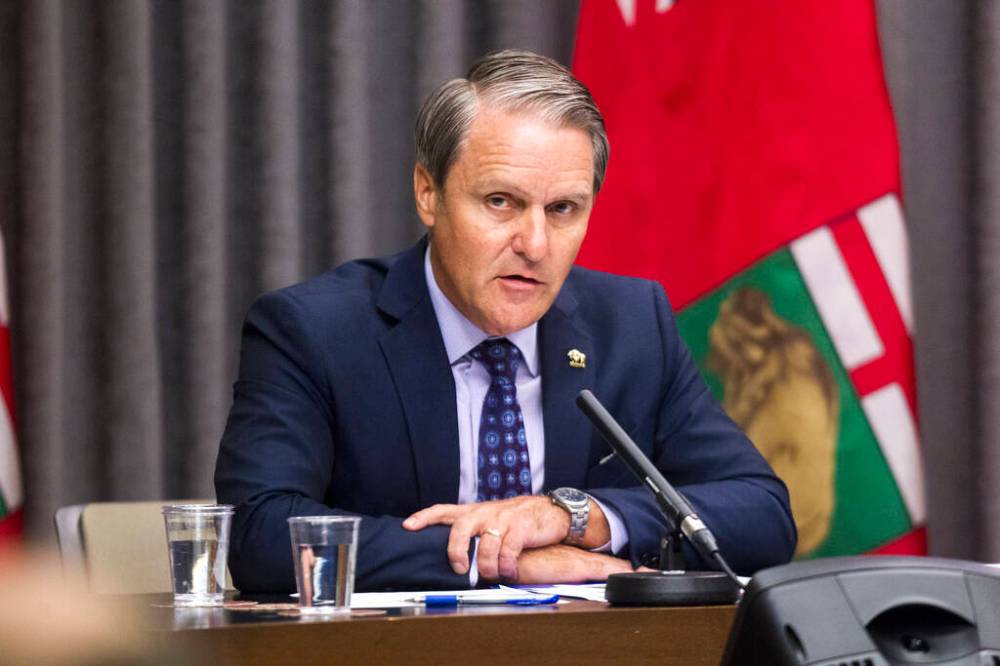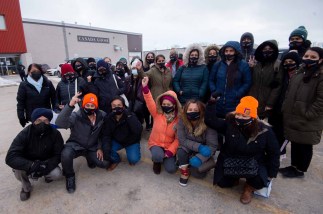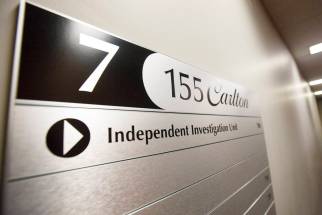IIU changes fall short of full accountability
Read this article for free:
or
Already have an account? Log in here »
To continue reading, please subscribe:
Monthly Digital Subscription
$0 for the first 4 weeks*
- Enjoy unlimited reading on winnipegfreepress.com
- Read the E-Edition, our digital replica newspaper
- Access News Break, our award-winning app
- Play interactive puzzles
*No charge for 4 weeks then price increases to the regular rate of $19.00 plus GST every four weeks. Offer available to new and qualified returning subscribers only. Cancel any time.
Monthly Digital Subscription
$4.75/week*
- Enjoy unlimited reading on winnipegfreepress.com
- Read the E-Edition, our digital replica newspaper
- Access News Break, our award-winning app
- Play interactive puzzles
*Billed as $19 plus GST every four weeks. Cancel any time.
To continue reading, please subscribe:
Add Free Press access to your Brandon Sun subscription for only an additional
$1 for the first 4 weeks*
*Your next subscription payment will increase by $1.00 and you will be charged $16.99 plus GST for four weeks. After four weeks, your payment will increase to $23.99 plus GST every four weeks.
Read unlimited articles for free today:
or
Already have an account? Log in here »
Hey there, time traveller!
This article was published 02/12/2021 (1489 days ago), so information in it may no longer be current.
Several proposed changes to the legislation governing Manitoba’s police watchdog are steps in the right direction, but the proposals stop short of addressing its biggest shortcoming — accused officers still won’t be required to co-operate with investigations into their alleged wrongdoings.
Manitoba moves to give police watchdog more bite

Posted:
The province has introduced changes to the Police Services Act to improve the police watchdog's communication with the Indigenous community and imposes fines and penalties on officers who break the new rules.
Public demands to make police more accountable have recently rung out loud and clear, in repeated protests claiming police acted improperly in specific cases, and in larger demonstrations calling for defunding of the police and redirecting the saved money to improving social services.
This is the turbulent background against which the Progressive Conservative government on Monday introduced proposed changes that had been promised for more than a year. There was considerable interest in whether the Independent Investigation Unit, established in 2015 as a police oversight agency, would finally get authority to compel police officers to co-operate and hand over their notes.
IIU has been thwarted by members of WPS, including the chief, emails suggests

Posted:
The young man steps onto the road, his stride quick as he cuts across the street. He has no idea what’s about to happen; he has no idea he’ll never see his family again.
Keeping tight-lipped when questioned by the IIU is the most common strategy of accused officers. An eight-month Free Press investigation in 2018 revealed 74 per cent of police officers in IIU probes refused to fully co-operate with investigators.
Will the proposed changes compel a higher level of compliance? The short answer is no. Police officers accused of wrongdoing would still be able to legally snub the civilian-led watchdog body.
Despite this failure of the proposed changes to breach the figurative “blue wall” — the term describing the tradition of police sticking together in shared self-preservation — some other revisions proposed in Bill 7 (the Police Services Amendment Act) should be welcomed.
Officers still employed by a police agency would no longer be seconded to serve as IIU investigators, preventing potential conflict of interest.
The IIU would also have to report publicly on each investigation, and explain why an officer is cleared.
Additionally, the bill creates a position within the IIU called “director of Indigenous and community relations,” a change touted by Justice Minister Cameron Friesen as a way to keep Indigenous people in the loop regarding investigations.
It’s unacceptable that, in a city with the nation’s largest urban Indigenous population, the IIU lacks adequate representation by Indigenous people in its 10-person investigative wing.
That’s a sensible addition, but it would have been better to go further and require the composition of the IIU to reflect the community most often in contact with police. It’s unacceptable that, in a city with the nation’s largest urban Indigenous population, the IIU lacks adequate representation by Indigenous people in its 10-person investigative wing.
These proposed changes are welcome, but are perhaps overshadowed by the bill’s failure to mandate that accused officers must co-operate fully with the IIU. The reason, according to Mr. Friesen, is that officers can’t be denied their legal rights and the stipulations in police contracts.
“We cannot simply override what the Charter (of Rights and Freedoms) says about your right not to incriminate yourself,” he said.
Mr. Friesen might be interested to learn Ontario may have found a legal way around the obstacle he feels is insurmountable.

That province has introduced a major overhaul to its civilian-led police watchdog, and it seems to oblige accused officers to comply. Changes to Ontario’s Special Investigations Unit Act state: “The former ‘duty to co-operate’ that bound police officers in relation to SIU requests is now a ‘duty to comply,’ which applies to all officials. An individual who fails to comply is guilty of an offence and could be subject to a penalty.”
Manitoba should investigate how Ontario and other jurisdictions are addressing the issue of unco-operative officers.
When police are entrusted with a gun, badge and a monopoly on the legitimate use of force, such power comes with an obligation to be accountable for actions. When the IIU asks questions, accused officers should have to answer.
History
Updated on Friday, December 3, 2021 2:11 PM CST: This article previously stated incorrectly that Winnipeg’s Independent Investigation Unit has never had an Indigenous member in its 10-person investigative wing. In fact, Cecil Sveinson, the Aboriginal liaison officer with the Winnipeg Police Service, served on the IIU.






